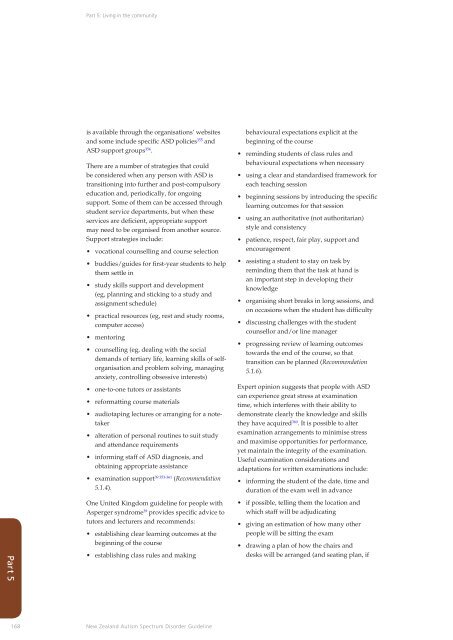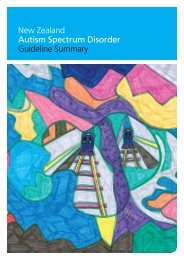New Zealand Autism Spectrum Disorder Guideline - Ministry of Health
New Zealand Autism Spectrum Disorder Guideline - Ministry of Health
New Zealand Autism Spectrum Disorder Guideline - Ministry of Health
You also want an ePaper? Increase the reach of your titles
YUMPU automatically turns print PDFs into web optimized ePapers that Google loves.
Part 5: Living in the community<br />
Part 5<br />
is available through the organisations’ websites<br />
and some include specific ASD policies 355 and<br />
ASD support groups 356 .<br />
There are a number <strong>of</strong> strategies that could<br />
be considered when any person with ASD is<br />
transitioning into further and post-compulsory<br />
education and, periodically, for ongoing<br />
support. Some <strong>of</strong> them can be accessed through<br />
student service departments, but when these<br />
services are deficient, appropriate support<br />
may need to be organised from another source.<br />
Support strategies include:<br />
• vocational counselling and course selection<br />
• buddies/guides for first-year students to help<br />
them settle in<br />
• study skills support and development<br />
(eg, planning and sticking to a study and<br />
assignment schedule)<br />
• practical resources (eg, rest and study rooms,<br />
computer access)<br />
• mentoring<br />
• counselling (eg, dealing with the social<br />
demands <strong>of</strong> tertiary life, learning skills <strong>of</strong> selforganisation<br />
and problem solving, managing<br />
anxiety, controlling obsessive interests)<br />
• one-to-one tutors or assistants<br />
• reformatting course materials<br />
• audiotaping lectures or arranging for a notetaker<br />
• alteration <strong>of</strong> personal routines to suit study<br />
and attendance requirements<br />
• informing staff <strong>of</strong> ASD diagnosis, and<br />
obtaining appropriate assistance<br />
• examination support 39 353-361 (Recommendation<br />
5.1.4).<br />
One United Kingdom guideline for people with<br />
Asperger syndrome 39 provides specific advice to<br />
tutors and lecturers and recommends:<br />
• establishing clear learning outcomes at the<br />
beginning <strong>of</strong> the course<br />
• establishing class rules and making<br />
behavioural expectations explicit at the<br />
beginning <strong>of</strong> the course<br />
• reminding students <strong>of</strong> class rules and<br />
behavioural expectations when necessary<br />
• using a clear and standardised framework for<br />
each teaching session<br />
• beginning sessions by introducing the specific<br />
learning outcomes for that session<br />
• using an authoritative (not authoritarian)<br />
style and consistency<br />
• patience, respect, fair play, support and<br />
encouragement<br />
• assisting a student to stay on task by<br />
reminding them that the task at hand is<br />
an important step in developing their<br />
knowledge<br />
• organising short breaks in long sessions, and<br />
on occasions when the student has difficulty<br />
• discussing challenges with the student<br />
counsellor and/or line manager<br />
• progressing review <strong>of</strong> learning outcomes<br />
towards the end <strong>of</strong> the course, so that<br />
transition can be planned (Recommendation<br />
5.1.6).<br />
Expert opinion suggests that people with ASD<br />
can experience great stress at examination<br />
time, which interferes with their ability to<br />
demonstrate clearly the knowledge and skills<br />
they have acquired 360 . It is possible to alter<br />
examination arrangements to minimise stress<br />
and maximise opportunities for performance,<br />
yet maintain the integrity <strong>of</strong> the examination.<br />
Useful examination considerations and<br />
adaptations for written examinations include:<br />
• informing the student <strong>of</strong> the date, time and<br />
duration <strong>of</strong> the exam well in advance<br />
• if possible, telling them the location and<br />
which staff will be adjudicating<br />
• giving an estimation <strong>of</strong> how many other<br />
people will be sitting the exam<br />
• drawing a plan <strong>of</strong> how the chairs and<br />
desks will be arranged (and seating plan, if<br />
168<br />
<strong>New</strong> <strong>Zealand</strong> <strong>Autism</strong> <strong>Spectrum</strong> <strong>Disorder</strong> <strong>Guideline</strong>











